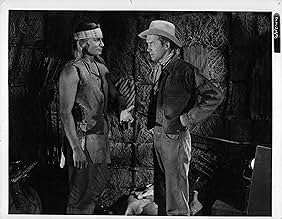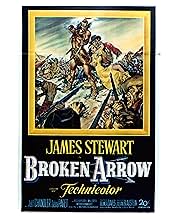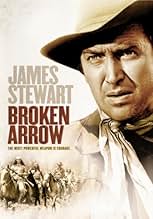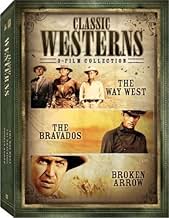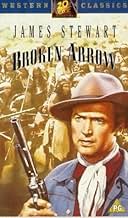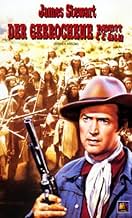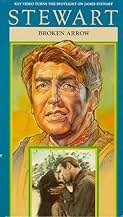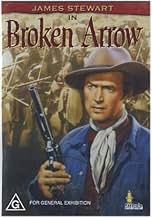IMDb RATING
7.1/10
10K
YOUR RATING
Tom Jeffords tries to make peace between settlers and Apaches in Arizona territory.Tom Jeffords tries to make peace between settlers and Apaches in Arizona territory.Tom Jeffords tries to make peace between settlers and Apaches in Arizona territory.
- Director
- Writers
- Stars
- Nominated for 3 Oscars
- 4 wins & 6 nominations total
Joyce Mackenzie
- Terry
- (as Joyce MacKenzie)
Robert Adler
- Lonergan - Stage Driver
- (uncredited)
Trevor Bardette
- Stage Passenger
- (uncredited)
Chris Willow Bird
- Nochalo
- (uncredited)
Raymond Bramley
- Col. Bernall
- (uncredited)
Chet Brandenburg
- Miner
- (uncredited)
Argentina Brunetti
- Nalikadeya - Cochise's Wife
- (uncredited)
Harry Carter
- Miner
- (uncredited)
Iron Eyes Cody
- Teese
- (uncredited)
J.W. Cody
- Pionsenay - Chosen Warrior
- (uncredited)
Heinie Conklin
- Townsman
- (uncredited)
Dolores Christine Cypert
- American Indian
- (uncredited)
- …
- Director
- Writers
- All cast & crew
- Production, box office & more at IMDbPro
Featured reviews
When I was a young boy I saw this picture. It was the first western in which the Indians were not uncivilised barbarians, but normal people, with their own standards. It was a revelation! At last one director had the courage to show this to us. So thank you, Delmer Daves! The performances of Jeff Chandler and James Steward were touching and also Debra Paget was fantastic. I do hope to see this film again someday on DVD. Hans Dullaart Delft Netherlands.
Delmer Daves offers an important major role to an Indian character, treating him with quality and esteem as human being...
Stewart plays a scout who seeks to heal the divisions between the Apaches and white men But while "Broken Arrow" is a perfectly acceptable depiction of frontier struggles, it does not display Stewart to the best advantages Delmer Daves was competent enough, but he lacked the ultimate virility and intensity of Anthony Mann
"Broken Arrow" examines, rather intensely and directly, the mistreatment and flagrant exploitation of the Indians by whites in the early West
The strength of this often lyrically photographed picture which will a1ways have an honorable place among Westerns lies particularly in the touching dignity of Stewart's love and marriage to an Indian girl (Debra Paget). Indian haters, of course, stir up the usual sort of trouble and Stewart's bride becomes a victim with all the consequent poignancy for which the film is best remembered
The over-wise Chandler counsels him that he must learn to live with his whiteness just as his new friends must contend with their own place in the cosmic scheme of things Cochise has words of stark consolation for Stewart: "As I bear the murder of my people, so you will bear the murder of your wife."
The most interesting aspect of " Broken Arrow" is not the interracial romance between Stewart and Paget, but Stewart's relationship with Chandler's Cochise There is intra-character complexity here, as Chandler struggles to overcome his disturb of all whites, and Stewart attempts to comprehend the different philosophy and cultural of the Indians
Jeff Chandler was quite apt and professional He was so believable in the role of the Apache chief Cochise that he was to essay it again in George Sherman's "The Battle at Apache Pass" in 1952 Chandler's facial bone structure lent itself to noble, incisive Indian profiles, and unlike other Caucasian actors he did not look out of place He was even nominated for Best Supporting Actor at that year's Oscars
Stewart plays a scout who seeks to heal the divisions between the Apaches and white men But while "Broken Arrow" is a perfectly acceptable depiction of frontier struggles, it does not display Stewart to the best advantages Delmer Daves was competent enough, but he lacked the ultimate virility and intensity of Anthony Mann
"Broken Arrow" examines, rather intensely and directly, the mistreatment and flagrant exploitation of the Indians by whites in the early West
The strength of this often lyrically photographed picture which will a1ways have an honorable place among Westerns lies particularly in the touching dignity of Stewart's love and marriage to an Indian girl (Debra Paget). Indian haters, of course, stir up the usual sort of trouble and Stewart's bride becomes a victim with all the consequent poignancy for which the film is best remembered
The over-wise Chandler counsels him that he must learn to live with his whiteness just as his new friends must contend with their own place in the cosmic scheme of things Cochise has words of stark consolation for Stewart: "As I bear the murder of my people, so you will bear the murder of your wife."
The most interesting aspect of " Broken Arrow" is not the interracial romance between Stewart and Paget, but Stewart's relationship with Chandler's Cochise There is intra-character complexity here, as Chandler struggles to overcome his disturb of all whites, and Stewart attempts to comprehend the different philosophy and cultural of the Indians
Jeff Chandler was quite apt and professional He was so believable in the role of the Apache chief Cochise that he was to essay it again in George Sherman's "The Battle at Apache Pass" in 1952 Chandler's facial bone structure lent itself to noble, incisive Indian profiles, and unlike other Caucasian actors he did not look out of place He was even nominated for Best Supporting Actor at that year's Oscars
Although the story is entertaining and the performances of James Stewart, Jeff Chandler and Debra Paget outstanding, what makes Broken Arrow a landmark film is its portrayal of the Apache Indians as something more than savage killers. Indians in the movies were always seen as brutal and inhuman. Here they are seen as people who want what the "white men" wanted: to live in freedom with their families on their own land and to live their lives in their own way.
Jeff Chandler is terrific as Apache leader Cochise, who he would play twice more in other films. There is a moving scene when they return from battle and he recites the names of those killed with a pained look in his eyes. Cochise and Stewart's character have a relationship which grows from mutual respect to a true friendship as they try to work out peace between the whites and indians. Stewart is looked on as a traitor by his friends and things are complicated further by his relationship with the young Apache girl played by Debra Paget.
I cannot think of another western in which indians have been portrayed as real people with emotions who hurt, who love. When this film was released 50 years ago, blacks, asians and American Indians were still being portrayed using the worst kinds of racial stereotypes.
Jeff Chandler is terrific as Apache leader Cochise, who he would play twice more in other films. There is a moving scene when they return from battle and he recites the names of those killed with a pained look in his eyes. Cochise and Stewart's character have a relationship which grows from mutual respect to a true friendship as they try to work out peace between the whites and indians. Stewart is looked on as a traitor by his friends and things are complicated further by his relationship with the young Apache girl played by Debra Paget.
I cannot think of another western in which indians have been portrayed as real people with emotions who hurt, who love. When this film was released 50 years ago, blacks, asians and American Indians were still being portrayed using the worst kinds of racial stereotypes.
Excellent adaptation of Elliott Arnold's book "Blood Brother" concerning the talk, the need, and the struggle for peace between the white man and the Apache Indians in 1870 Arizona. James Stewart is very effective as a brave former Scout for the Union who used to kill Indians but who now wants the slaughters to stop; he learns their tongue, sends up a smoke signal, and is soon in conference with Cochise himself to allow the U.S. mail-riders safely through Apache terrain...he also finds love with Indian princess Debra Paget, a romance his racist white brothers obviously resent (and at least one Apache soldier as well). Strong, moving story relies on the complicated interpersonal relationships between the characters for its impact, and the performances from Stewart, Paget, and Oscar-nominated Jeff Chandler do not disappoint. Beautifully filmed on rugged locations, Delmer Daves directs a winner, one of the best westerns of its era. *** from ****
As the war rages between the American settlers and the Apache, former soldier Tom Jeffords happens upon a young Indian wounded after an attack. Taking upon himself to aid the boy, it's not long before the Apache show up intent on killing Jeffords by way of the war instincts. Pleading for Jeffords' life, the boy manages to get him spared by the Apache chief, Cochise. It's the start of a friendship that may just bring and end to the war and peace across the west.
Tho not the first "social" Western film made, Broken Arrow, it can be argued, is maybe one of the most important and telling genre films of the 50s. Showing humanist portrayals of the Apache and dealing out level headed tellings of the relationships between whites and the Native Americans, Delmer Daves' film is as relevant today as it was back on release. Adapted from Elliott Arnold's novel Blood Brother, the story follows Jeffords (a measured and fine James Stewart) as he attempts to broker peace between the warring factions. Firstly by convincing Cochise (Jeff Chandler bang on form) to allow the mail run thru the pass, something that brings suspicion and calls of Indian lover from Jeffords' own kind, and then to finally set up a peace pact at a time when violence and hatred was rife in the west.
As the friendship between the two men grows, Jeffords and an Apache girl fall in love (beautiful Debra Paget as Sonseeahray), thus giving the story a further jolt of momentum. The screenplay then really hits its stride, as Daves and his crew pit peace and inter racial love against a backdrop of bloodshed and savagery. Never glossing over just how hard peace is going to be, Broken Arrow retains intelligence and a sensitivity even as breakaway factions from both sides (for example we see Geronimo split the Apache and form a renegade front) are intent on killing off the peace process. It even has time for deep emotional kickers to reinforce the point of just how tough and unlikely peace and tolerance can be sometimes.
Broken Arrow was, and still is, a bold picture. In fact it can be argued that for the likes of Daves and Stewart, it was at the time very bold and risky career moves. But it paid off because the film stands up today as a picture of some distinction. It's themes and approach to its subjects are something that this generation, and all the future ones, will always find to be socially important. Boosted by Hugo Friedhofer's luscious score and taking advantage of the Lone Pine location shoot, Broken Arrow is a fine fine film that even non Western fans should be looking to absorb. 8/10
Tho not the first "social" Western film made, Broken Arrow, it can be argued, is maybe one of the most important and telling genre films of the 50s. Showing humanist portrayals of the Apache and dealing out level headed tellings of the relationships between whites and the Native Americans, Delmer Daves' film is as relevant today as it was back on release. Adapted from Elliott Arnold's novel Blood Brother, the story follows Jeffords (a measured and fine James Stewart) as he attempts to broker peace between the warring factions. Firstly by convincing Cochise (Jeff Chandler bang on form) to allow the mail run thru the pass, something that brings suspicion and calls of Indian lover from Jeffords' own kind, and then to finally set up a peace pact at a time when violence and hatred was rife in the west.
As the friendship between the two men grows, Jeffords and an Apache girl fall in love (beautiful Debra Paget as Sonseeahray), thus giving the story a further jolt of momentum. The screenplay then really hits its stride, as Daves and his crew pit peace and inter racial love against a backdrop of bloodshed and savagery. Never glossing over just how hard peace is going to be, Broken Arrow retains intelligence and a sensitivity even as breakaway factions from both sides (for example we see Geronimo split the Apache and form a renegade front) are intent on killing off the peace process. It even has time for deep emotional kickers to reinforce the point of just how tough and unlikely peace and tolerance can be sometimes.
Broken Arrow was, and still is, a bold picture. In fact it can be argued that for the likes of Daves and Stewart, it was at the time very bold and risky career moves. But it paid off because the film stands up today as a picture of some distinction. It's themes and approach to its subjects are something that this generation, and all the future ones, will always find to be socially important. Boosted by Hugo Friedhofer's luscious score and taking advantage of the Lone Pine location shoot, Broken Arrow is a fine fine film that even non Western fans should be looking to absorb. 8/10
Did you know
- TriviaAt 41, James Stewart was 26 years older than Debra Paget, who was still only 15 when filming began in early June 1949.
- GoofsWhen General Howard is beginning to pick himself off the ground after the Apache attack on the military wagon train, the first shot shows the ground to be mostly desert sand, with very little vegetation, but when the scene jumps to a long shot of the General getting up, the ground around him is almost entirely covered with green vegetation, showing scarcely any sand at all.
- ConnectionsFeatured in Family Classics: Family Classics: Broken Arrow (1963)
- How long is Broken Arrow?Powered by Alexa
Details
Box office
- Gross worldwide
- $10,145
- Runtime1 hour 33 minutes
- Aspect ratio
- 1.37 : 1
Contribute to this page
Suggest an edit or add missing content



